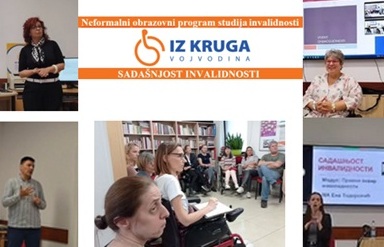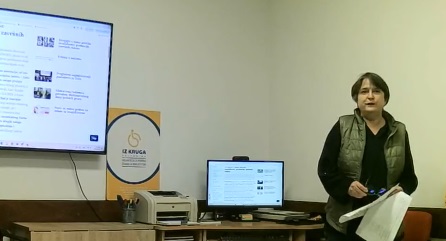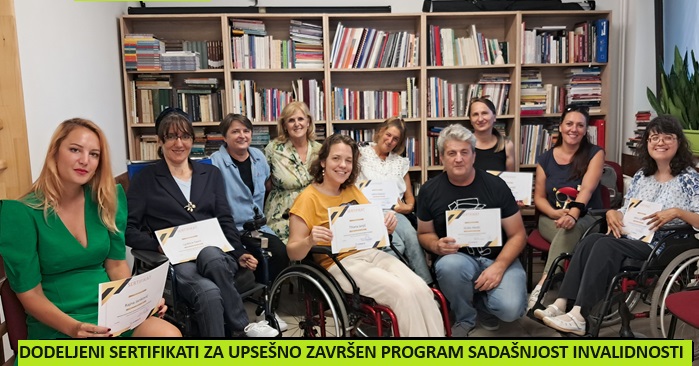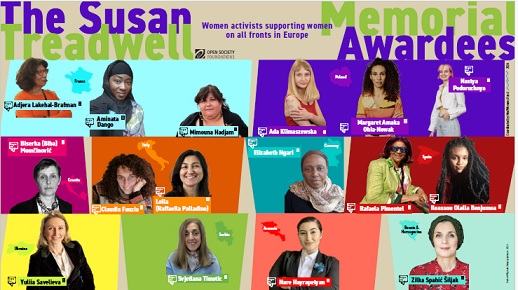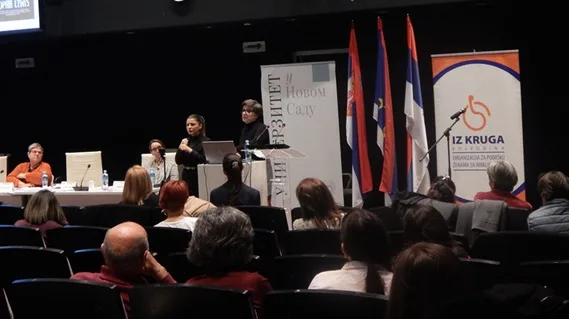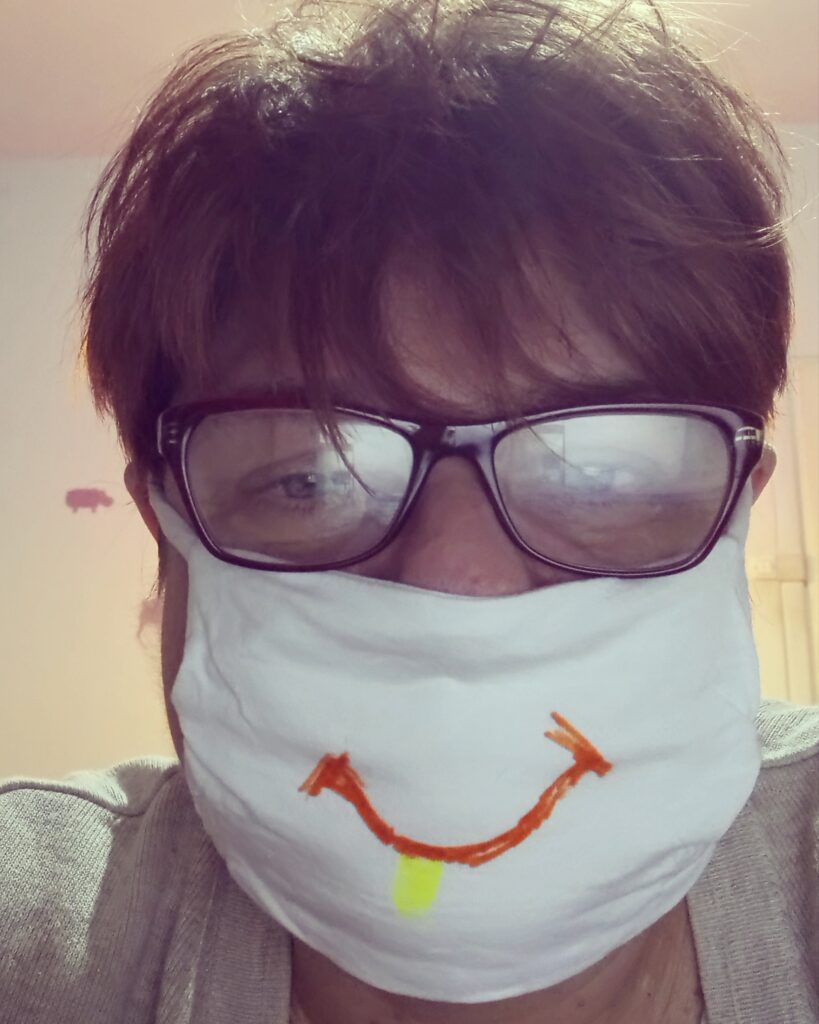
Tatjana Stojšić Petković, psychologist, laughter yoga leader, activist for the rights of persons with disabilities, psychological workshop facilitator and provider of individual support to women with disabilities in the … IZ KRUGA VOJVODINA Organization, speaks for the Disability Portal about current topics: how to take care of our mental health in days during which we are exposed to fear and uncertainty, what are the greatest challenges of women with disabilities during the period of isolation and the pandemic, what self-help techniques are available to of all us and what can we do to try and turn this newly-occurred situation around and make it work for us.
Based on your current practice, what challenges concerning mental health do women with disabilities face during the state of emergency related to the corona virus?
TSP: – Every long-term stress situation, along with uncertainty about how long it will last, brings a specific type of unrest, by nature we all want to know some timeframe for things. In this situation we don’t have a timeframe, nor do we know the outcome, so we guess and make different assumptions. Women with disabilities I work with, react in different ways, depending on the person’s temperament, circumstances they are exposed to. When the state of emergency was declared, the reactions were mostly: – All right, I can handle this. I organized everything. I live alone but I have my neighbors’ support. In a very short time, some ten days after later, the story changed completely: – This is lasting too long, I don’t know how I’ll cope! As a therapist, it was difficult for me not to fall into the trap of confronting them with what they had said a week earlier, because it would make no sense. Searching for the right literature, I remembered a guidebook I used before in work with children in the context of war situations of the nineties, and noticed there is an overlap in the phases that we are going through now: denial, panic, acceptance and raising self-motivation.
The way we cope with the current situation greatly depends on the relationship with persons we live with. For someone who has lived in a relationship of trust or of good cooperation, this is a time for developing deeper bonding through long and quality conversations. If someone is in a bad partner relationship or in a bad relationship with those in their immediate environment, the situation has only become worse. The situation of women who live in a violent relationship, has become worse. Mothers of children with disabilities now feel marginalization more intensively. Some have gone to their holiday homes, to be alone with their children, because other household members can’t bear to be together in the new situation. For me this is devastating, as I find it very difficult to stay supportive and not say: – This is a situation in which you should think about whether you accept the given circumstances at all. The support system has completely changed, we can’t apply some of the principles we generally apply. For example, in the therapy process, the clients always face their own responsibility and the things they can do on their own. Women victims of sexual violence are an exception, because they hold no responsibility for what was done to them. In the current situation, this applies to the majority: a client can’t take responsibility for the state of emergency and all that it implies. Generally, we now don’t have support where we once had it, the focus has shifted. We all say that we now have more time for ourselves and our family, but family dynamics have substantively changed. To some of my clients I suggested writing instead of having online conversations, because this is now the only way they can have privacy.
Moreover, women with disabilities feel an additional dose of bitterness, disappointment and anger, which are not emotions that are easy to deal with. Everyone is complaining about restrictions of movement and isolation today, and that has been, for a lot of women with disabilities, a reality for many years. Their spontaneous reaction is: – Let them see how it is! I haven’t been able to go out for twenty years! This is not a rection with bad intentions, but it rather shows that women are aware of all the things they’ve overcome, the things they gave up, the things they’ve learned to live with. Now, when someone else is telling them about it, they think: – You see how it is for me, and nobody thinks about it.
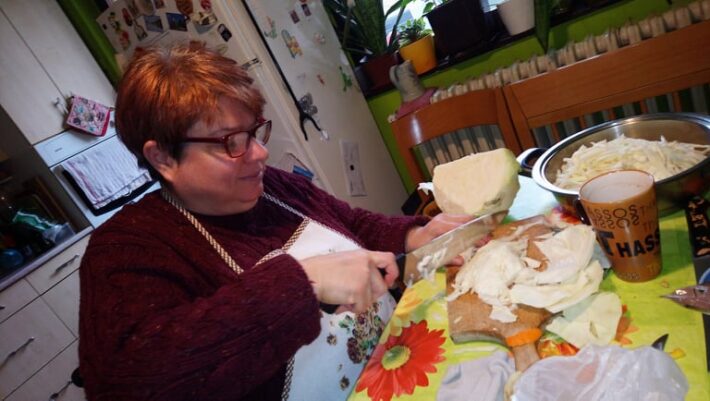
If women are focused on informative programs and television, that represents a pathway towards depression. Fear is inevitable, and once we get out of the situation, you can’t just rub different fears out like with a rubber. Once fears appear, the question is how we are going to deal with them later on. The key fear in this situation is the fear of death, fear or helplessness, fear that things will turn bad for me and for those I rely on. We don’t usually face these fears so often and so intensely. Women with disabilities fear being placed in collective centers like the fair, because nobody considers how someone who moves with difficulty, who has a sight or hearing impairment would function in these centers.
It would seem we are increasing the level of humaneness and we are developing additional support systems, but paradoxically it is becoming evident that marginalized groups are now even more marginalized. I contacted several voluntary organizations to check how they are providing support to persons with disabilities. They told me the hadn’t even thought about it. We have to think about marginalized persons and provide support to them in an appropriate way.
You mentioned the importance of interpersonal relations. Tell us more about this: how are interpersonal relations complicating now, what can we do to improve communication with household members during the quarantine?
TSP: – If in the newly-occurred situation we live with someone we don’t know very well; the process of learning and adapting is inevitable. Some women with disabilities now rely on someone that did not help them before or they had personal assistance at one point, but are using it now only at home. It is necessary to establish a different way of communication. We all get upset more easily now, because fear and uncertainty are omnipresent: we don’t know what announcements there will be by noon or by the end of the day, whether the quarantine will be extended to 24 hours or similar. As our relationships get more and more complicated, it is important to recognize the things we can do something about, and those we can’t. We can try to be all right with ourselves and be patient with ourselves and others. Differences now become stronger and more evident in relationships. Let’s say a household member refuses to wear a mask or wash hands; or that they believe this is biological warfare, while others have their own theories. Someone will feel cast off by their own family because of these views. People now rely more on each other; they need to communicate and make decisions about daily activities and use of common space. Before, people in many families met only briefly during the day. How can we work on patience if we are annoyed by everything? It’s important to focus on the fact that this can’t last forever, and use this as a starting point for setting personal tasks and goals.
What mini self-help techniques or exercises could you recommend for crisis situations?
TSP: – The consumption of sedatives is high, which I consider detrimental, because medicine and other substances should not be something we turn to as a first option. Alcoholism is also increasing, because many people are using this situation to justify excessive drinking. Avoiding the situation will not make it go away. Having a routine is important. It is common that when we think we have plenty of free time, that’s just when we don’t manage to get anything done. That is why I recommend a daily schedule: – What can I do and when? It doesn’t need to be a long-term plan, it can cover the following several days. It is important to set aside time on a daily basis for activities we like. Breathing techniques are extremely beneficial, accessible to all and everyone can do them. I invite everyone to join A daily dose of laughter every evening at 8. These are 15-minute free laughter yoga classes that will help you take a break from everyday events. Many beneficial techniques are easily accessible and simple to do. In my work with clients I use laughter yoga, breathing techniques, meditation and EFT, a technique that can be used in all conditions and regarding any topic.
Tell us something about your work on fractals and why drawing is important to you right now.
TSP: – I’ve been in self-isolation since March 15th and I have to admit I was in a quite rebellious mood during the first several days: – Nobody is going to forbid me from going out! But then I accepted that this is a way of protecting myself and others. As a wheelchair user, I inevitably touch numerous surfaces entering or exiting my building, entering the elevator, while moving generally. Based on a conversation with a friend, a doctor and someone I trust, I concluded it’s best for me to stop going out, no matter how much that clashes with my temperament. I informed my clients that I was working online in the new situation and I really have a lot of work. When all the therapy-related conversations are over, I need to deal with my own mental hygiene. I am in contact with a lot of people, who react from panic and exaggeration to the negation of the situation. All that affects me. For me to stay me and prevent other people’s thoughts to intrude mine, I need to do something for myself. As I am not the kind of person who looks for a shoulder to cry on, nor is there currently a person I would put into that role, I started drawing fractals and using colors that bring me a feeling of harmony, health and happiness. This helps me immensely. Otherwise, I use the method of fractal drawing in my work with clients, but it is difficult to implement it in online communication.
What is the greatest challenge for you during these days?
TSP: – Supporting other household members, because I have the impression that they are processing this situation differently than I am, but in a way that I do not lose myself. Besides drawing fractals, I started riding an indoor bicycle for which, allegedly, I did not have time before. During the thirty-minute training, I let household members organize themselves completely on their own, to get out of the inconvenient role I took over. I am learning not to be there for everyone, but to be there, above all, for myself, so that my health would be all right, as I belong to a high-risk group. I was in bed with the flu four years ago and I was told the next flu would not be without serious consequences. I was in hospital for three weeks; it really took a toll on my body and there are still some consequences. I was not afraid only of the infection, but of the circumstances I would find myself in case I fell ill. In those situations, people are alone, relying only on medical workers. I had to work on that fear for a long time, to prevent myself from constantly thinking about this situation. Laughter yoga helped me fight the fear.
What could be a specific advantage of being in this situation?
TSP: – I like it that we discuss in the family what we are going to watch on tv, that there are no sports matches and other content I did not like. It is great we can visit museums online, watch operas, theatre plays. We have free access to different cultural content and online courses, which we should use. It is good that we all have to asks ourselves what our purpose is, why we are here, what we can do for our life and other people important to us. I believe we are asking some philosophical questions we did not ask before.
What is the first thing you will do when this is over?
TSP: – Visit the Fruška Gora National Park.
